Executive Summary
Small business owners know it makes good business sense to care for their employees, and they also genuinely care for the people who work for them. However, they often struggle to provide key benefits, including paid family and medical leave, which they believe would help them recruit and retain their workers. With small businesses struggling to compete with large companies that can offer attractive benefits packages, it should come as no surprise that small business owners support establishing a universal paid family and medical leave program that would make it easier for them to facilitate their employees’ access to the paid time off they need to support their families while keeping their jobs.
A new national scientific opinion poll conducted for Small Business Majority and the National Partnership for Women & Families by Lake Research Partners found that 79% of small business owners support the creation of a national paid family and medical leave program that would guarantee employees wage replacement for up to 12 weeks, funded by 0.5% employer and employee contributions each. The leave could be for welcoming a new child (born or adopted), or a serious health condition or injury for an employee or a family member. This would allow employees to take time away from work for their own serious illness, to care for a seriously ill family member or to take parental leave to care for a newborn child. Support for a national paid family and medical leave program has been steadily increasing in recent years. In 2017, a Small Business Majority poll found 70% of small business owners supported such a paid leave program.“Small Businesses Support Paid Family Leave Programs.” Small Business Majority and Center for American Progress. March 30, 2017. https://smallbusinessmajority.org/our-research/workforce/small-businesses-support-paid-family-leave-program At that time, just three states had fully implemented paid family and medical leave programs; today, 10 states (including the District of Columbia) have programs fully in effect, with four more in the process of implementation.“State Paid Family & Medical Leave Insurance Laws.” National Partnership for Women & Families. July 2024, https://nationalpartnership.org/wp-content/uploads/2023/02/state-paid-family-leave-laws
Small business owners believe that offering paid family and medical leave is the right thing to do, and 80% would like to offer more paid leave than they can currently afford. This is an issue that is already familiar to small business owners, with nearly half (45%) reporting that they’ve had at least one employee take extended leave of more than one week in the past year. Furthermore, 43% of small business owners have taken extended leave themselves to care for immediate family.
Yet only about half of small businesses are able to offer any paid family or medical leave to their employees, with 56% offering medical leave for serious health needs and 51% offering parental leave for a newborn child. And even among small businesses that offer some leave, most can’t match the three months that a national paid leave program would provide. Of those who offer some medical leave or short-term disability leave for employees’ own serious health needs, roughly two-thirds (67%) offer one month or less, and of those who offer some parental leave, more than half (53%) offer one month or less.
The survey also found that a national paid family and medical leave program is more popular than alternative policies. Small business owners prefer a universal paid family leave program for small businesses over a voluntary insurance program that businesses could choose to buy into by a two-to-one margin (a respective 61% and 31%). Forty percent would also prefer to replace the federal Employer Credit for Paid Family and Medical Leave (established in the 2017 Tax Cuts and Jobs Act) with a guaranteed family and medical leave insurance program, versus just 16% who support extending the current tax credit.
It’s important to note that the sample is politically diverse and that small business owners’ support for paid leave transcends party lines: 93% of Democrats, 74% of independents and 72% of Republicans support a national paid family and medical leave program.Of the 500 business owners polled by Lake Research Partners, 45% respondents self-identified as Republicans, 36% as Democrats and 14% as Independents. Five percent responded either Other, Unsure, or Prefer not to answer.
Key Findings
- Nearly 8 in 10 (79%) small business owners support enacting a national paid family and medical leave program that would guarantee employees wage replacement for up to 12 weeks, funded by 0.5% employer and employee contributions each. This support extends across party lines with large majorities of Democrats (93%), Independents (74%) and Republicans (72%) in favor of this program.
- Small business owners believe offering paid family and medical leave is the right thing to do. The vast majority of small business owners (86%) support access to paid leave as an employer and also as someone who cares about the people who work for them, with more than half (53%) strongly agreeing.
- More than three-quarters (78%) also are convinced that paid family and medical leave boosts employee morale and productivity.
- Only about half of small businesses offer some paid leave for serious health or caregiving purposes, with 56% offering some paid medical leave for serious health needs. Half of small businesses offer some paid parental leave for parents with a newborn child, and just 29% for adoptive or foster parents.
- Eight in 10 small business owners would like to provide more paid family and medical leave than their business can currently afford, with 45% strongly agreeing with this statement.
- Nearly half (45%) of small business owners have had employees take extended leave to care for a new child, for their own health needs, or to care for a family member with a serious illness.
- Many small business owners have taken extended leave themselves: 43% have taken more than a week of leave to care for an immediate family member, and 16% have taken leave to care for an extended family member or friend.
- When asked to choose between two approaches, small business owners are about twice as likely to support a universal paid family and medical leave program (61%) than a voluntary insurance program that businesses could choose to buy into (31%).
- Small businesses would prefer to replace the Family Leave Tax Credit with a guaranteed family and medical leave insurance program: Four in 10 business owners support replacing the current Family Leave Tax Credit with a national insurance program. Just one in six (16%) small business owners report wanting to only keep the current tax credit.
Small businesses support a national paid family and medical leave program
An overwhelming majority (79%) of small business owners support the creation of a national paid family and medical leave program that guarantees employees wage replacement funded by both employer and employee contributions, with nearly 4 in 10 small business owners (38%) strongly supporting it. Notably, only 14% of small business owners would oppose such a program. This support for national paid family and medical leave marks a 9 point increase from Small Business Majority’s research in 2017, which found that 70% of small business owners would support establishing such a program. The program’s popularity transcends party lines: 93% of Democrats, 74% of independents and 72% of Republicans support it. Additionally, the program finds broad support among business owners across race and ethnicity, including white business owners (75%), Black business owners (92%), Latino/a business owners (92%), Native American and Indigenous business owners (92%) and Asian American and Pacific Islander business owners (94%). Young women small business owners (93%) and Black women small business owners (98%) are its strongest supporters.
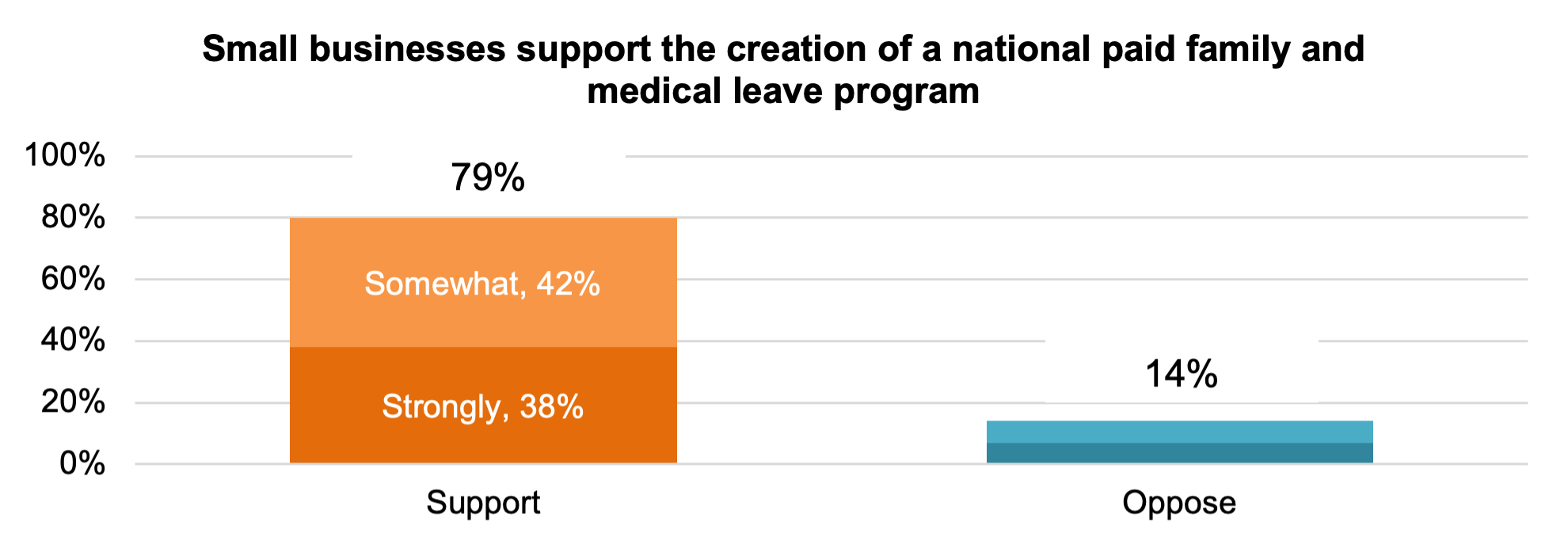
Small business owners support paid family and medical leave for several reasons. First, more than 9 in 10 (91%) small business owners agree that employee morale is better when they know they can take care of themselves and their families if needed without losing their job, with 6 in 10 strongly agreeing. Most agree (88%) that employees are more invested in the business when they know they can stay despite changes in life circumstances, with 52% strongly agreeing. Small business owners also agree (84%) that businesses have a more cohesive team when turnover is lower, and 83% think that paid leave programs give businesses more reason to invest in employees, resulting in a more skilled and specialized workforce. Lastly, they believe (84%) that paid leave programs make businesses better able to retain highly skilled and experienced employees and avoid retraining, and they also believe (83%) that paid leave programs give businesses the ability to attract and retain a more diverse workforce.
Small businesses are limited in their ability to offer paid family and medical leave on their own
Small businesses are facing a difficult labor market nationwide as they compete with larger corporations for talented employees. Nearly two-thirds (64%) of small business owners say it’s challenging to recruit and retain employees, with Latino/a (75%) and Black (74%) entrepreneurs and Republicans (73%) particularly struggling. Robust benefits are crucial to both employee retention and for people to obtain financial security. Small employers overwhelmingly agree that paid medical leave for serious health conditions (92%), paid family leave for a family member’s serious health condition (86%), paid family leave for a new child (85%) and job protection while on family or medical leave (90%) are important for people to obtain financial security.
Yet only about half of small businesses offer at least some paid family or medical leave to their employees. Just over half (56%) offer paid medical leave or short-term disability leave for an employee’s own health needs, and about half offer paid parental leave for a newborn child (51%) or for pregnancy and/or childbirth (50%). Only 36% offer paid family leave to care for relatives with serious health needs. The gap between the lower shares of small businesses offering paid family and medical leave, and small business owners’ high levels of support for offering paid family and medical leave, points to the need for public policy solutions.
By contrast, small business owners are more likely to offer shorter-term forms of paid time off, with the most common forms being paid vacation time (63%) and paid sick days for short-term illness or preventative care (59%).
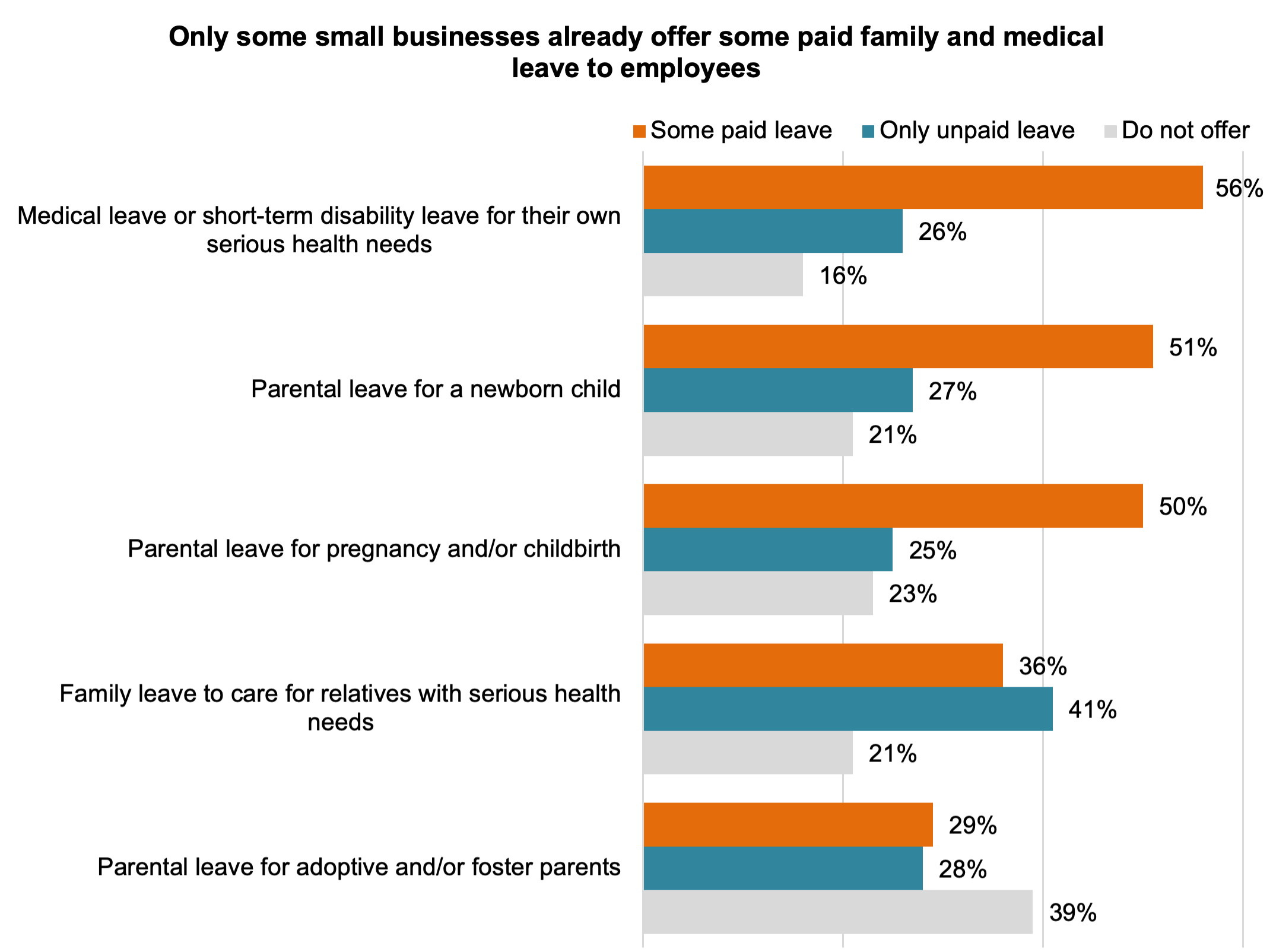
In addition, most of the small businesses that offer some paid family or medical leave are unable to offer robust policies:
- Among those offering paid medical leave, 67% offer one month or less.
- Among those offering paid leave for pregnancy or childbirth, 54% offer one month or less.
- Among those offering some paid parental leave for a newborn child, 53% offer one month or less.
- Among those offering paid parental leave of adoptive and/or foster parents, 64% offer one month or less.
- Among those offering paid family leave to care for relatives with serious health needs, 71% offer one month or less.
Small businesses want to offer more paid leave
There is a clear gap between the amount of paid leave that small businesses do offer and the amount they would like to provide. Eight in 10 small business owners would like to offer more paid family and medical leave than their business can currently afford, with 45% strongly agreeing. In particular, Latino/a (90%), Black (89%) and younger women (88%) small business owners would like to be able to offer more paid family leave.Younger small business owners are defined as those under age 50.
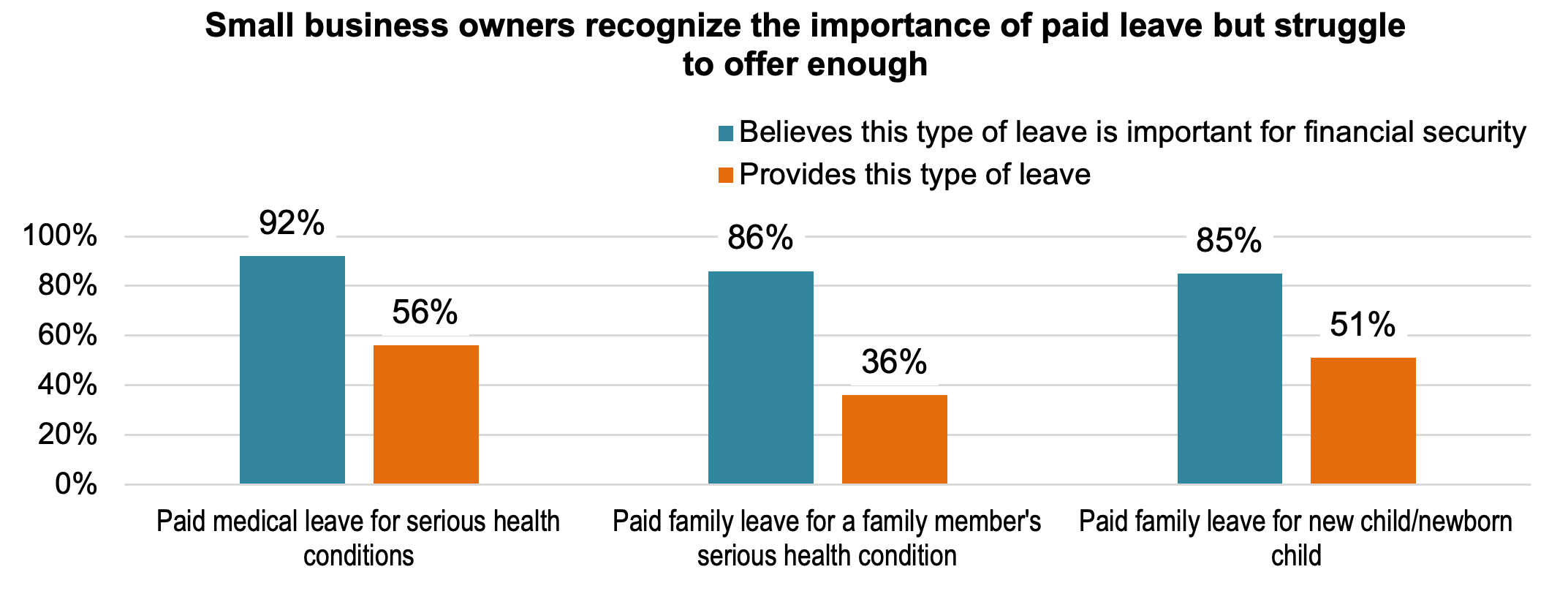
Eighty-two percent of small employers think that having access to paid family and medical leave is important to their employees’ economic security. Additionally, 86% of small business owners support access to paid family and medical leave as an employer and someone who cares about the people who work for them, with more than half (53%) strongly agreeing. A substantial share of small business owners (14%) also report losing employees due to a lack of paid family or medical leave, particularly business owners of color: 46% of Native American or Indigenous owners, 43% of Black business owners, 35% of Latino/a business owners, and 33% of Asian American and Pacific Islander business owners say that insufficient paid family or medical leave has caused a valued employee to quit or leave their business.
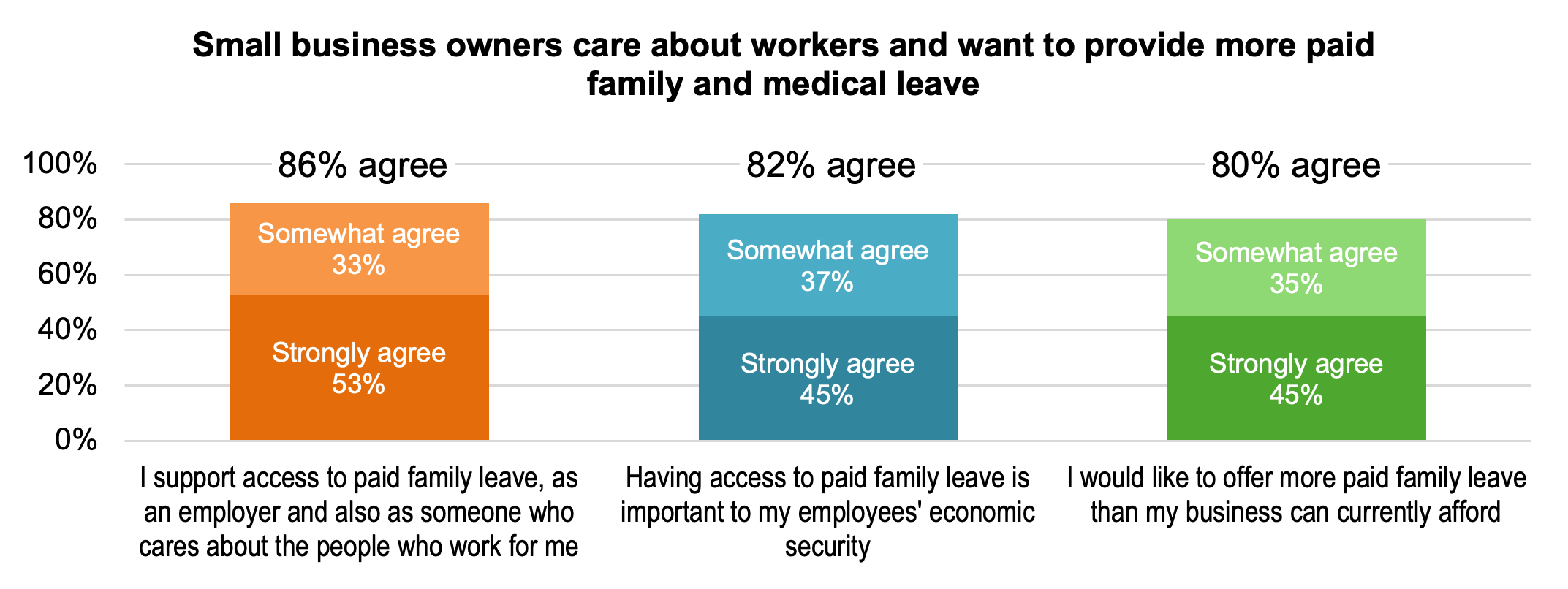
This support for paid leave is underscored by the fact that small businesses already have experience with extended employee leaves: 45% of small business owners have had one or more employees take more than a week of paid or unpaid leave in the past year to care for a new child, take care of their own serious health needs, or to help a family member with a serious illness. Black (61%), Latino/a (66%), Asian American and Pacific Islander (62%), and Native American or Indigenous (58%) business owners are more likely to have had one or more employees take extended leave than white business owners (40%). Small employers are already experienced with managing the business impacts of employee leaves. When an employee takes extended time off, small business owners typically take on more work themselves (55%), assign work temporarily to other employees (44%), cover work some other way (34%) and hire temporary replacements (27%).
Notably, small employers who have had an employee take extended leave in the past year are more likely to support a universal paid family and medical leave program: 73% of employers who have not had an employee take extended leave support a universal paid leave program, compared to 89% of those who have had at least one employee take extended leave, and 92% who have had many employees take extended leave.
Furthermore, small business owners themselves are impacted by the need to take time away from their work. Forty-three percent have taken more than a week to provide care for an immediate family member, while 16% have done so for an extended family member or friend. Younger small business owners were more likely to have taken extended leave, particularly Black (77%), Latino/a (85%), Native American or Indigenous (81%) and younger women (62%) entrepreneurs. Caregiving responsibilities led some small business owners to modify their existing businesses (33%) or start a new business (11%). Half of small business owners did not make any significant changes to their business as a result of taking extended leave.
Small employers who have personal experience with needing to take leave are also more supportive of a universal paid leave program than those who have not. Among those who have not needed to spend time providing care, 71% support a universal paid leave program, compared to 87% of those who have taken time to care for immediate or extended family or a friend.
Small businesses prefer a universal paid family and medical leave program over other proposals
There are a number of policy proposals on the table that aim to help small businesses offer paid family and medical leave. In a head-to-head matchup, small business owners are about twice as likely to prefer a universal paid family and medical leave program (61%) over a voluntary insurance program for paid family and medical leave that businesses could choose to buy into, with premiums set by insurance companies rather than the government (31%). This holds strong across party lines, with majorities of Democrats (76%), Independents (53%) and Republicans (53%) preferring a universal program.

Another alternative to a universal paid family leave program is a tax credit that Congress enacted in 2017. Employers who offer up to 12 weeks of paid family and medical leave to employees under a certain salary threshold and pay at least 50% of the wages normally paid to the employee are eligible for the credit. The leave can be used to take care of a worker’s own health, a family member or newborn, or a newly adopted or fostered child. In exchange for offering the leave, employers who provide full wage replacement will receive up to a 25% tax credit for the amount of wages replaced.
With the Family Leave Tax Credit currently set to expire in 2025, small businesses want Congress to implement a universal paid leave program. Four in 10 support replacing the Family Leave Tax Credit with a guaranteed family and medical leave insurance program that would cover the full cost of family leave for most businesses, and nearly one-quarter (23%) support both extending the credit and replacing it with the insurance program. Only 16% support extending the Family Leave Tax Credit as currently written.
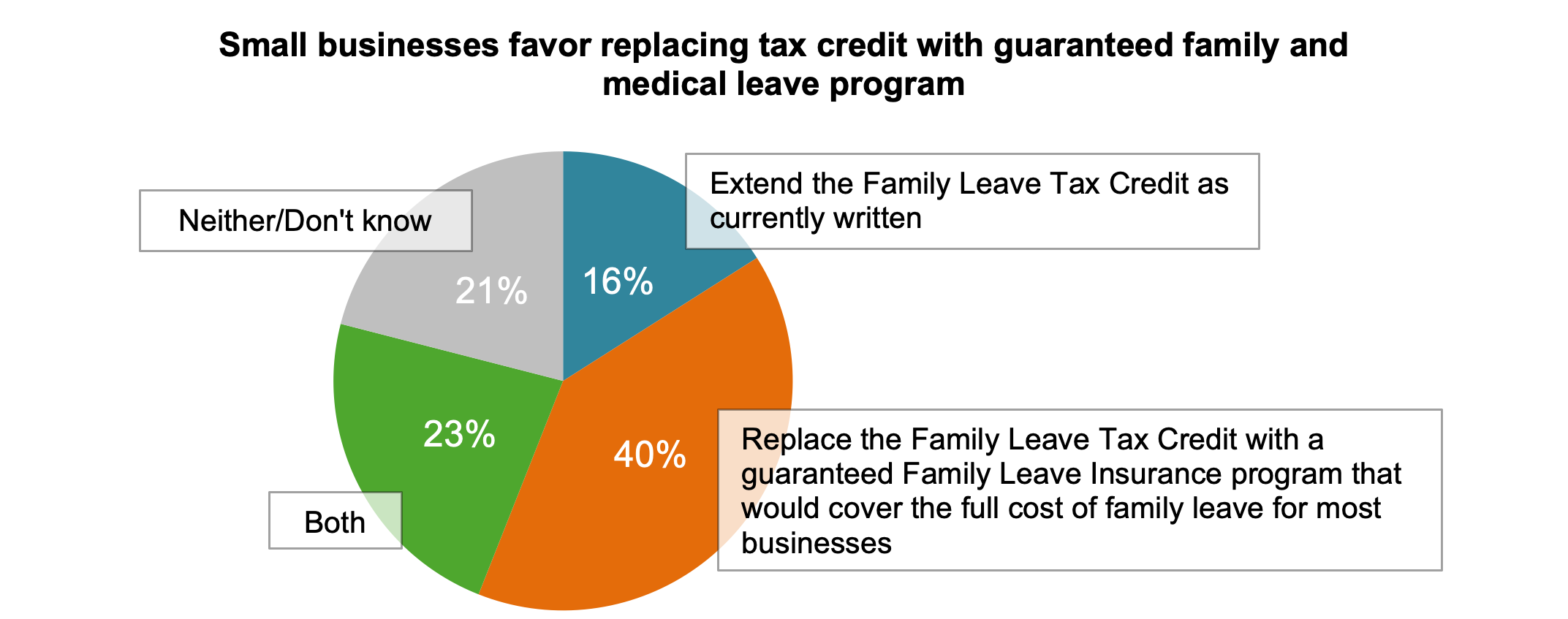
Conclusion
Small businesses overwhelmingly support a national paid family and medical leave program, and they think it would improve employee morale and help with recruitment and retention. About half of small businesses are able to offer some paid leave, although a large majority would like to offer more than they can currently afford. This support is underscored by how many small businesses have been impacted by extended leave, with both small business owners and their employees having taken extended leave to care for themselves or family members. While there are other policy proposals like voluntary insurance programs and tax credits, policymakers looking to implement paid family and medical leave should take note that a universal program is the most popular approach among small business owners.
Methodology
Lake Research Partners designed and administered this survey, which was conducted online. The survey reached a total of 500 small business owners nationwide, plus oversamples of 100 small business owners each in Michigan, Pennsylvania, North Carolina, and South Carolina, and 100 small business owners of color nationwide. The survey was conducted August 13-21, 2024. The sample was stratified by gender, region, race, and business size to reflect the demographic composition of small business owners nationwide. Respondents were politically mixed: 45% were Republicans, 36% were Democrats and 14% were Independents. Where there were slight differences between our survey sample and the expected voting population, data were weighted accordingly. The margin of error is +- 4.4% at a 95% confidence level.
➤ Download this report as a PDF
➤ Download the state-specific fact sheets
➤ Download report toplines from Small Business Majority’s website

